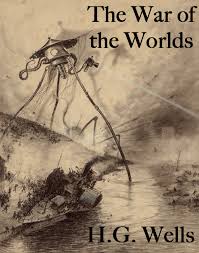War of the Worlds (1894) by H. G. Wells.
Good Reads meta-data is 192 pages, rated 3.83 by 316,380 litizens.
Genre: Sy Fy.
DNA: Brit.
Verdict: In the beginning.
Tagline: And so they came.
When I saw that there were more than 12,000 reviews posted on Good Reads…. I realised there was need for one more!
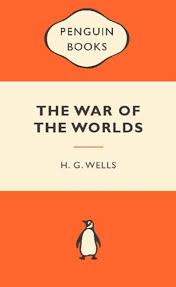
The opening narrative is perfect, and it has been retained in the 1953 film version (the only one I have watched), though I endured the first three episodes of the 2019 Anglo-French television production. The latter did not retain the narrative but opted for something else which I have now forgotten. No doubt something the producer thought the audience could relate to, i.e., sex, money, or both. It has run to 24 episodes, but even the first three had already discarded Wells’s story.
Back to the book, it starts well with that omniscient narrative, and the first landing and contact, and to be sure there are some gripping scenes that made it into the 1953 film. Hiding out, confusion, despair, regret, destruction are all described by the hero who survives by accident. He wanders around scenes of incomprehensible catastrophe and describes the Martians and their devices in some detail. In this account Wells shows more imagination than most science fiction film makers today. Hero also reports that the Martians to be vampires in rather more detail than any contemporary film maker would venture. Implicitly, one reason they have come to Earth is to harvest living human blood, and they cage survivors for later consumption, some of which Hero sees. The 1953 film omits this aspect, and so leaves completely unexplained why they came and later how they came to be infected.
The one film version I have seen changes the curate into a one-scene fool and deletes the soldier. These two were crucial to Wells, though admittedly they do not advance the plot, but that is because there is no plot to advance. Wells was an expository writer and his novels seldom had plots, and this one doesn’t. The aftermath of events are described while we wait….
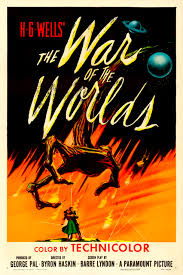
As to religion, while he had to include the conventional appeals to the all mighty to protect himself in Victorian England, he despised religion (see any biography of the man), and in between prayers and invocations, these pages show the pathetic uselessness of religion in such a crisis. Indeed, the curate, while hiding from the Martians, prays so fervently that he is about to give away their hiding place with his ever louder hosannas so that Hero clubs him to death with a meat clever to silence him. I doubt this murder is in any of the film versions.
The soldier is another whipping boy for Wells. His working class instincts for survival are admirable but anything more than a half-return to savagery is beyond his intelligence. Not that hero has anything better to offer himself for all his intelligence as he acknowledges.
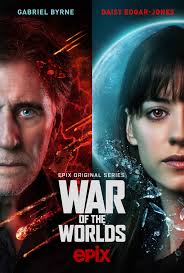
Instead of these characters the film versions invariably insert a love interest and or a family, where none exist in the original. Something for Average to identify with, I guess, but it takes away emphasis from the Martians even if it does provide a plot.
By the way, in Wells’s text the title is somewhat misleading, for on Earth the only country invaded is England. The unspoken assumption seems to be that it is the leading power of the world and once it is subdued the rest can done piecemeal.
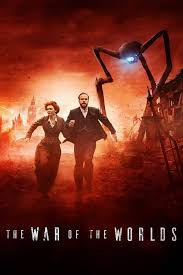
I said I have only watched one version through to the end but I have sampled many others in this endless franchise. While on a long flight I even saw a few minutes of the version that midget did.
There is an ingenious twist on this invasion in The Great Martian War 1913-1917 (2013). Recommended. There are also Russian and Soviet versions.
What is absent from the films I have sampled, and a quick scroll down the Good Reads reviews confirms it is the absence is any reference to what was likely Wells’s intention.
And what is that, you ask?
Go ahead, ask it!
Consider this Martian invasion as a metaphor for British colonialism for it is the only country attacked; it is singular: Strange unknown creatures descend from unimaginable ships and conquer all with incredible weapons, while remaining largely impervious to the resistance of the native peoples.

Why have they come? Why are they here? Why is it now? What can we do? In reply to none of these questions can the native religion provide either an explanation or assistance. Nor can the technology of their weapons protect them against these advanced beings.
Thus do European colonists subdue the native population, and proceed to live off its back.
When these Martian colonists take over, what slows their conquest, and eventually stops it is the world itself, its vegetation (there is a lot of gardening in Wells’s text that never makes it into the films) and bacteria.
I complained about the plot because there is too much ruminating by hero during his wander. It is not a quest but simply a walkabout. And in these lengthy asides, not only is the action, such as it is, stopped, but the timeline is broken repeatedly with post hoc interpolations, so we know from early on all will be well for Hero.

As is de rigueur for Wells, there is also an egotistical element when hero goes on about being a misunderstand intellectual, especially at the end. But in this dose it is less distracting, irritating, unnecessary than in some of his other novels.
Having unavoidably been exposed, if only in passing, to so many entries to this franchise, I realised that I had never read the foundation text, now I have.WW 1

